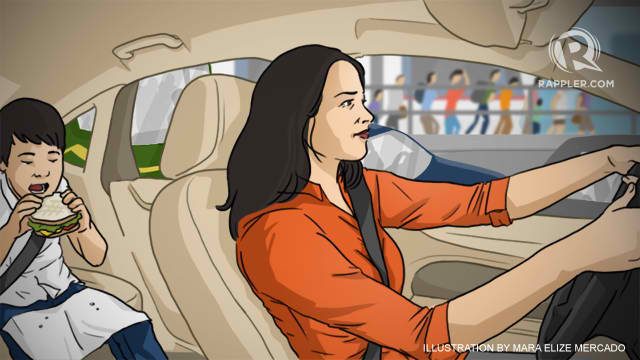SUMMARY
This is AI generated summarization, which may have errors. For context, always refer to the full article.

MANILA, Philippines – Road safety advocates are pushing for the passage of a bill that would require owners of private vehicles to install child restraint devices for children 12 years and below.
Representatives from government agencies, local government officials, and civil society groups discussed House Bill 1319 or the proposed Child Restraint Act during a hearing of the House committee on transportation on Wednesday, May 3.
House Bill 1319 requires all owners of private motor vehicles to install an age-appropriate child restraint device for children in their cars.
The bill also stresses the importance of installing child restraint devices that comply with international standards and would be appropriate to the specific needs of a child.
“I think we can use international standards and the [Land Transportation Office] can also abide by these because these are also all already tested by different manufacturers and different countries,” said Buhay Representative Mariano Michael Velarde, proponent of the bill.
Currently, Republic Act 8750 or the Seat Belts Use Act of 1999 requires the driver and passengers of a moving vehicle to wear seat belts.
It also prohibits infants and children 6 years old and below from sitting in the front seat of any running motor vehicle.
But Velarde pointed out that the law does not require the use of child restraint devices, which road safety advocates say is crucial in preventing serious injuries or deaths in the event of a car crash.
Although the Philippines has enacted road safety legislation, it does not have a law requiring the use of child restraint devices in motor vehicles.
Moreover, road crash deaths in the Philippines have been increasing since 2006. From 6,869 deaths in 2006, the numbers jumped to as high as 8,666 in 2014. More than 500 children die every year.
More suggestions
While there was general approval for the proposed measure, road safety advocates from the public and private sector raised several suggestions.
Marijoy Segui, deputy executive director of the Council for the Welfare of Children, suggested that the name “Child Restraint Act” be replaced with “Child Passenger Safety Act” for the sake of clarity.
Segui also suggested that child restraint devices could differ depending on the child’s age, weight, height, or disability, if any.
It was also suggested that a public information campaign should be launched following the passage of the bill to effectively disseminate information.
Representatives also suggested that penalties for violations should be increased should the bill be passed into law.
Currently, Section 4 of House Bill 1319 states that violators face a fine of P5,000 or imprisonment of not more than 30 days, or both. The violator’s license may also be revoked after two violations.
Another suggestion proposed lowering the age requirement from 12 to 10 years old instead.
According to Dr Roque Dagulo of the Department of Social Welfare and Development, children as old as 12 can already manage without a child restraint device in the vehicle.
Other suggestions raised during the hearing included providing an instruction guide for parents on the proper use and installation of car seats.
Government agencies such as the trade department’s Bureau of Product Standards should also ensure that seat belts and child restraint devices comply with local and international standards. – Ishbelle Bongato/Rappler.com
Ishbelle Bongato is a Rappler intern
Add a comment
How does this make you feel?
There are no comments yet. Add your comment to start the conversation.